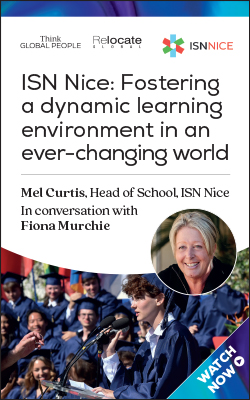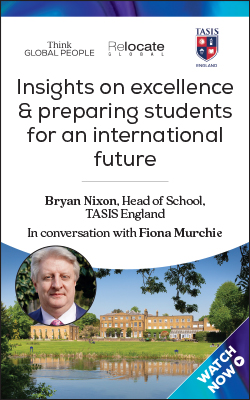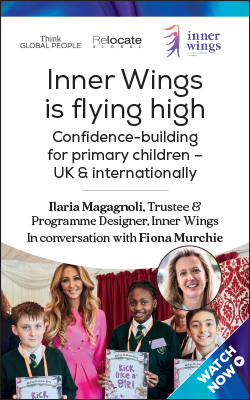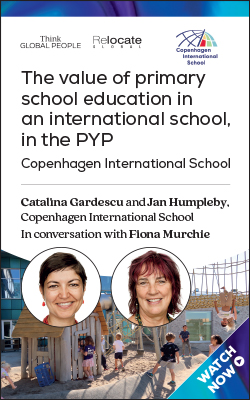Nine benefits of international education for students
What is international education and why is it important? Christina Adamopoulou, Head of Marketing and Communications, at TASIS, explains.

You might be an internationally mobile expatriate family that is relocating to another country. Perhaps you are looking for a different option than the local school offering the national curriculum. Or you might be a student looking to broaden your horizons, improve your language skills, enhance your learning experience by studying abroad. In all of these cases, international education has a lot to offer.
What is international education?
The criteria for an international education offered by the International Baccalaureate® (IB) might be summarized as a "…comprehensive approach to education that intentionally prepares students to be active and engaged participants in an interconnected world." This approach to teaching and learning incorporates a global perspective by providing several different views of the same topic or learning experience.Learn or master a language
Studying abroad or in an international school accelerates fluency in speaking, reading, and writing a foreign language by providing students with the opportunity to hone their language skills in the classroom and through interaction with their multilingual peers. International schools may offer a bilingual program or a wide variety of languages taught through their curriculum. Students can not only become fluent in more than one language but will also be academically prepared for future study in another language.Experience different styles of education
Most international schools offer curricula that are recognized around the world, however, each country has its own education system. Moved out of their "comfort zone," students are helped to adapt within a new but supportive learning environment. This early experience will serve them well in the future by making them more versatile in the workplace, with the confidence to meet new challenges and the ability to adjust to different management styles.Learn about other cultures and perspectives
An international experience allows students to expand their worldview and develop cross-cultural awareness and international-mindedness by enhancing their understanding of different cultures, perspectives, and views.By interacting with peers and teachers with different backgrounds and upbringing, students will begin to value each one’s unique story and develop a more holistic approach to life's experiences, both at school and in the future. Understanding and appreciating the diversity of cultures and perspectives worldwide helps students become compassionate, open-minded, global citizens who can lead change in the world.International education promotes a healthy questioning of personal beliefs, and the influence of their own culture and upbringing. It helps students create and maintain bonds with others who may be from a different culture. Students learn to value the diverse contributions of others as they hone their problem-solving and communication skills. The development of self-confidence, self-awareness and an enhanced ability to adapt to diverse environments and perspectives will provide them with long-term benefits.
Develop a global network of life-long friends and connections
Both in and out of the classroom, an international education experience enables students to develop friendships and build lasting relationships with the entire school community and beyond.Developing and maintaining a network of friendships or professional relationships with people from all over the world is undoubtedly a life-enriching experience that will stay with students forever. The wider the network, the greater the likelihood that students will be exposed to exciting career and social opportunities.
Discover the world
International education offers a wide range of exciting experiences to see and understand the world through travel, engagement with schools from other countries, and connections with people from around the world.International schools often develop academic travel programs as an integral part of their curriculum, enabling students to experience a new country and culture. International schools may be connected to and engage with other schools globally, offering opportunities to interact with their linked communities. Organized events celebrating different customs, cuisines, holidays, and more are part of daily school life. Exposure to these activities is intrinsic to an international student’s development.
Impress universities and future employers
Universities and employers highly value experience in international environments as they search for candidates with transferable learning skills and the ability to collaborate.According to figures from a study by the Institute of International Education (IIE-Abroad Survey) and the University of California, between 90% and 95% of students with an international education found work in their sector within the six months following their graduation.
Students can use their international school experience to demonstrate to future employers that they have the open mind, adaptability, resourcefulness, and drive needed in an ever-changing work environment. These attributes improve employability and give a competitive edge in the workforce.
Identify opportunities for leadership development and community service
Through co-curricular activities, academic travel programs, and community service initiatives, international schools offer a vast array of opportunities for students to develop leadership skills and contribute to society, locally and globally. Students are encouraged to use their knowledge and talents to make an impact and lead change.Interact with faculty and staff with a global perspective
International schools are usually rich with teachers and staff from all over the world. At TASIS England, for example, over 30 languages are spoken on campus. Students’ learning is enhanced by the different perspectives that each member of the faculty and staff brings.Be part of a truly diverse community
The lives of students and their families are enhanced through engagement with an international community that nurtures global understanding, compassion, and a curiosity to learn about different cultures. While nearly 60 countries are represented at TASIS England, the community comes together to welcome newcomers and help them make the transition to a school that provides students and families with an experience that is as inclusive as it is diverse.Why is international education important?
Recent data gathered by ISC Research revealed a growing global trend for international education. As of January 2019, there were 10,282 international schools with 5.36 million students, and 503,000 staff members around the world. A demand for a "Western-style" education and the increasing prominence of the International Baccalaureate and Cambridge Assessment system means the education landscape globally is undergoing a progressive transformation.More and more, families are embracing international education to enrich their children’s lives by exposing them to a multicultural learning environment that fosters understanding, promotes an appreciation for different cultures and perspectives, and supports positive change in the world.
The TASIS England mission is to nurture intellectual curiosity and embolden each learner to flourish as a principled, open-minded, and compassionate member of a global community.
We shape the academic journey for each learner, supporting and challenging them to reach their full potential. As an international school, we offer our students a choice between Advanced Placement (AP) and the International Baccalaureate Diploma Programme (IBDP) and work with them to forge their individual learning experience. TASIS prepares students for the future, whatever path they choose to pursue – on average, 96% of our graduates receive offers from their 1st or 2nd choice university.
Watch the webinar replay: Outstanding early years education for international families with Melodi Jordan, Head of Lower School, TASIS The American School in England, and Carmen Powell, children’s author and education professional, in conversation with Fiona Murchie
Follow for more content and features from the Great International Education and Schools Fair
Subscribe to Relocate Extra, our monthly newsletter, to get all the latest international assignments and global mobility news.Relocate’s new Global Mobility Toolkit provides free information, practical advice and support for HR, global mobility managers and global teams operating overseas.
 Access hundreds of global services and suppliers in our Online Directory
Access hundreds of global services and suppliers in our Online Directory©2025 Re:locate magazine, published by Profile Locations, Spray Hill, Hastings Road, Lamberhurst, Kent TN3 8JB. All rights reserved. This publication (or any part thereof) may not be reproduced in any form without the prior written permission of Profile Locations. Profile Locations accepts no liability for the accuracy of the contents or any opinions expressed herein.




































